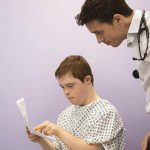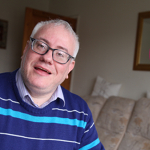Almost a quarter of healthcare professionals have never attended training on how to meet the needs of patients with a learning disability, according to new research released today to launch Mencap’s Treat me well campaign; aimed at ending the scandal of unequal health treatment for people with a learning disability.
The new research from YouGov and Freedom of Information Requests to NHS Trusts has revealed that healthcare professionals and hospital trusts have been failing to make simple, reasonable adjustments to the care of someone with a learning disability that are legal duties under the Equality Act 2010 and can save lives.
A significant proportion of healthcare professionals surveyed (45%) believe a lack of proper learning disability training is contributing to the 1,200 avoidable deaths every year of people with a learning disability; that this issue does not receive enough attention from within the NHS (59%); and that they would like more training specifically focussed on patients with a learning disability (66%).
Ten years ago Mencap highlighted the issue of avoidable learning disability deaths, and in response to on-going concern since it was created NHS England has made learning disability a national priority. Mencap is calling for these efforts not to be made in vain by ensuring no health professional can set foot in a hospital without having had training on learning disability.
YouGov survey of more than 500 healthcare professionals revealed¹:
- Almost a quarter (23%) of healthcare professionals have never attended training on meeting the needs of patients with a learning disability.
- Over 1 in 3 (37%) healthcare professionals think the quality of healthcare received by patients with a learning disability is worse than that received by patients without a learning disability.
- Almost half (45%) of healthcare professionals think that a lack of training on learning disability might be contributing to the avoidable deaths of people with a learning disability.
- 59% think the issue of avoidable deaths does not receive enough attention from the NHS.
Freedom of Information requests sent to NHS Foundation Trusts and English universities offering courses in medicine, or adult nursing revealed²:
- Almost half (47%) of hospitals do not include information on learning disability in their induction training for clinical staff.
- Almost a quarter (22%) of universities do not include training on making reasonable adjustments to the care of someone with a learning disability (which are a legal duty under the Equality Act 2010) in their undergraduate medicine degree.
****Definition of reasonable adjustments in notes to editors.
Survey of 500 people with a learning disability revealed4:
- Over 1 in 5 (21%) think that healthcare staff are bad at explaining things to them when they are at the hospital.
- 75% said their experience of going to the hospital would be improved if staff explained things in a way that was easy to understand.
Nicholas Jones was just 27 years old when he was admitted to hospital and died less than one month later. A Coroner’s Court ruled recently the death was contributed to by ‘gross failures’ in care. Nick’s Mum Sue said:
"Our son Nick was a vibrant, happy, young man with a mischievous sense of humour. He was participating in new activities and had so much more to explore and achieve when he was
admitted to hospital for an emergency kidney operation.
“We desperately tried to raise our concerns with hospital staff about the poor care Nick was receiving on a daily basis - instead of listening to us and making reasonable adjustments to ensure Nick received the care he needed, staff dismissed our concerns and we were treated as a nuisance.
“I had to continually repeat details about Nick’s medical condition, his needs, his abilities etc. and often left the hospital anxious and frightened that either there was no one available to care for Nick during the night, or whoever was there had no knowledge about him.
“On the day Nick died I persistently alerted staff on the ward to the fact that Nick was extremely unwell and repeatedly asked for a doctor to come and assess him. I could see the signs that Nick was deteriorating and pleaded with staff to act but was perceived to be a hysterical, over protective mother and no one took my concerns seriously. Nick suffered a respiratory and cardiac arrest and I was left alone to perform CPR on my son until the crash team arrived.
“We will never forget the sequence of events that led to Nick's preventable death. All we can hope for now is that Nick's death and the failures that led to it will show how vital it is for all health professionals to be trained in how to support patients with a learning disability and how crucial it is to work in partnership with family members and carers and to really listen to them - as they are advocates for all those without a voice. Hopefully, then future avoidable deaths of patients with a learning disability who are so vulnerable may be prevented."
Jan Tregelles, chief executive at the learning disability charity Mencap, said:
“Every day, three people with a learning disability die avoidable deaths. Yet, a quarter of health professionals say they have never been given training on learning disability. We all need to act to fix this.
“NHS England has made real efforts to improve care for people with a learning disability but this scandal has been well known over a decade, and families still contact us who believe their loved ones should not have died whilst in hospital care.
“Government and NHS England must now ensure no healthcare professional steps foot in a hospital without having training on providing healthcare to people with a learning disability. We know health professionals want this too. No family should be left wondering whether or not their loved one could have been saved.”
Royal College of Nursing Chief Executive and General Secretary Janet Davies said:
“No patient should ever die or be harmed because healthcare staff haven’t had the right training to care for them properly. Nursing staff want to be able to deliver the best possible care to every patient, but they need the right education to be able to do that. Providers and commissioners of healthcare must offer every member of the nursing team training in how best to meet the needs of people with learning disabilities, and universities must meet their legal obligation to train student nurses in how to provide information for patients with learning disabilities in a way they can understand. The scandal of 1200 avoidable deaths a year among people with learning disabilities must be halted”.
-ENDS-
For further information or to arrange interviews, please contact the Mencap press office on 020 7696 5414 or media@mencap.org.uk or for out of hours 07770 656 659.
Notes to editors









